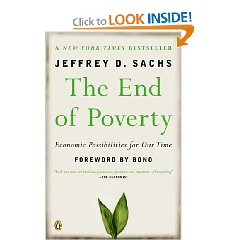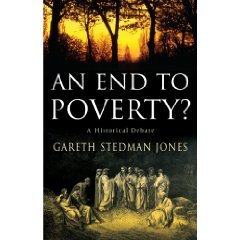From an American perspective, now that everyone knows Senator John Edwards has focused on poverty as the underpinning for his revisitation of the “two Americas” divide (see also Barbara Ehrenreich
Nickel and Dimed: On (Not) Getting By in America and David Shipler's
The Working Poor: Invisible in America, this book should receive even more attention.
The author is extraordinary, and I take issue with some of the quibbling pot shots (when you are in fact so central to something that both the UN Secretary General and the President of Columbia University want you in the top position, perhaps you just might *be* central).
The most important thing I can say about this book is that the timing is perfect–there is a “correlation of forces” emerging that combines An Army of Davids: How Markets and Technology Empower Ordinary People to Beat Big Media, Big Government, and Other Goliaths (see my review of that book), The Left Hand of God: Taking Back Our Country from the Religious Right (ditto), Collective Intelligence (see my review of Tom Atlee, The Tao of Democracy: Using Co-Intelligence to Create a World That Works for All) and a massive public awareness that both the Republican and Democratic parties are corrupt and dysfunctional (see Peter Peterson's Running on Empty: How the Democratic and Republican Parties Are Bankrupting Our Future and What Americans Can Do About It and Tom Coburn's Breach of Trust: How Washington Turns Outsiders Into Insiders ), and that the rampant unilateral evangelical militarism and immoral capitalism that the Bush dynasty has imposed on the earth is in fact a stake in the heart of the American Republic.
It may not be an exaggeration to say that this book represents the pinnacle of “new thinking” in which the public is energized into realizing three great precepts:
1) Republics belong to the people–the government of a Republic can be dissolved by the people when it becomes pathologically dysfunctional. See The Vermont Manifesto.
2) Sovereignty as defined by the Treaty of Westphalia is passe, in that it supports 44 dictators and massive corruption, censorship, genocide, state crime, and so on. There is a place for sovereignty, but only when certain standards of legitimacy, morality, transparency, and sustainability are present. See Breaking the Real Axis of Evil: How to Oust the World's Last Dictators by 2025 and Philipp Allott's The Health of Nations: Society and Law beyond the State.
3) Poverty is the fulcrum issue for the world, just as democracy is the fulcrum issue for America. If one reads this book in combination with C. K. Prahalad's The Fortune at the Bottom of the Pyramid: Eradicating Poverty Through Profits (Wharton School Publishing Paperbacks), it is crystal clear that a shift of money from militarism to education, health, wireless access, and micro-cash economics will unleash the entrepreneurial innovation of five billion people, and literally save the world.
There are a number of stellar aspects to this book.
The author warms my heart when he slams the International Monetary Fund (IMF) and World Bank for being ignorant and having the wrong economic model. His articulations of the need for “differential diagnosis,” and for the development of “clinical economics” are Nobel Prize material. He is right on target when he lambastes the IMF for overlooking “poverty traps, agronomy, climate, disease, transport, gender, and a host of other pathologies.” A different take on the IMF and World Bank is provided by John Perkins in Confessions of an Economic Hit Man while the contributing delinquency of immoral multinational corporations is addressed by William Grieder in The Soul of Capitalism: Opening Paths to a Moral Economy and US insanities are addressed by Clyde Prestowitz in Rogue Nation: American Unilateralism and the Failure of Good Intentions.
The author has clearly been influenced by Paul Farmer and his book Pathologies of Power: Health, Human Rights, and the New War on the Poor (California Series in Public Anthropology, 4) and uses the emergency medicine model to discuss how clinical economics varies from developmental economics. One could say that some nations need to learn to read and feed themselves first, and only after doing so, are they capable of moving up the rung. Lest anyone think the author is over-reaching, he is quite clear on limiting his objective to the elimination of EXTREME poverty, not all poverty.
The bottom line is quite clear: for just 1% of the US GDP, or a 5% surcharge on families making over $200,000 a year, extreme poverty can be eliminated by the year 2025. Anyone familiar with Hans Morgenthau and the “sources of national power” will understand that people rather than geography or resources or military power are the fundamental unit. People can think and share information and innovate. The author clearly discusses how disease destroys labor–including the entire male working class in Africa, and how disease, poverty, and education interact. The checklist for “medical triage” of a country, on page 84, is superb. The “big five” interventions are Agricultural, Health, Education, power-transport-communications, and safe drinking water-sanitation.
The author takes special care to dispel a number of myths, chief among them the myth that African corruption makes foreign aid irrelevant. While there is a great deal to be said for aid mis-management leading to black markets and such (see William Shawcross, Deliver Us from Evil: Peacekeepers, Warlords and a World of Endless Conflict) the bottom line is clear: the US Government is both well behind other more enlightened governments in its rate of giving, and downright incompetent at “doing” aid. Indeed, the author can be noted for his general critique of all “official advice” as being generally ignorant.
This is not an ivory tower idealist. He discusses ten examples of global scale success stories from the Green Revolution to cell phones in Bangladesh, and settles on Stabilization, Liberalization, Privatization, Social Safety Net, and Institutional Harmonization as the steps needed to migrate from failed state to stabilized state.
Interestingly, he disassociates himself from the Harvard professors that helped the Russian oligarchs loot the Russian state through predatory privatization, and deliberately slams Professor Andrew Shleifer's role on page 144.
The author appears to be the first person to write a fifteen page plan for migrating a country (Poland) from a socialist economy to a market economy, writing from midnight to dawn due to local time pressures. This book is nothing short of riveting. It will stand the test of time as a prescription that can be explained to the voters, understood by politicians, and enforced by democratic elections.
There is only one small flaw: ending poverty will increase the number of stronger beings jostling for a move up in the pecking order. The program will need to be accompanied by both very strong militaries and police, and by very strong conservation efforts to keep increasingly strong billions from fighting over decresing resources.
EDIT of 11 Dec 07: Since reading this book, 24 of us have come together to co-found the Earth Intelligence Network, and we have a vision for teaching the five billion poor “one cell call at a time” using Telelanguage.com and 100 million volunteers with Skype and Internet access, covering among them the needed 183 languages. By creating wealth locally (see below list of representative books), this is stabilizing and addresses my own concern from the earlier review.
See also:
Infinite Wealth: A New World of Collaboration and Abundance in the Knowledge Era
The Wealth of Knowledge: Intellectual Capital and the Twenty-first Century Organization
Powershift: Knowledge, Wealth, and Power at the Edge of the 21st Century
Revolutionary Wealth: How it will be created and how it will change our lives
and most importantly,
The Wealth of Networks: How Social Production Transforms Markets and Freedom









